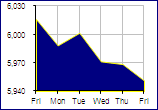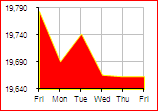Why Isn't Socialism Dead?
Even after the grave failures of many socialist experiments, why isn't socialism dead? Why is it still growing in the Southern American countries? I got hold of one excellent article over this, and since my understanding isn't very deep, I'll just quote from the article. Read the full piece here, its intense but extremely interesting.
[..]The Peruvian economist, Hernando de Soto, has argued in his book, The Mystery of Capital, that the failure of the various socialist experiments of the twentieth century has left mankind with only one rational choice about which economic system to go with, namely, capitalism. Socialism, he maintained, has been so discredited that any further attempt to revive it would be sheer irrationality.The piece also talks about the theory of Scientific Socialism by Marx - "Capitalism, he argued, had been a good thing; a necessary step that mankind had to take to advance forward; but, according to Marx, capitalism would eventually suffer from an internal breakdown. It would simply stop producing the goods. Like feudalism before it, capitalism was inevitably bound to pass away as a viable system of social organization, and then, and only then, would socialism triumph." With the current capitalistic tendencies, its not very hard to see that the gap between the rich & poor is widening. Laissez-faire would most be one extreme of free-market economy, which would crush the poor totally, hence we need government to make policies to control the market forces. But what if the goverments aren't up to it? As the number of have-nots would grow to be manifolds of haves, wouldn't the utopian dream of a socialistic society catch their fancy? That's what I think is happening in the South America.
[..]When Hernando de Soto asserts that capitalism is the only rational alternative left to mankind, he is maintaining that capitalism is the alternative that human beings ought to take because it is the rational thing to do. But what human beings ought to do and what they actually do are often two quite different things. For human beings frequently act quite irrationally, and without the least consideration of what economist called their "enlightened self-interest." And it is in this light that we must approach the problem, Why isn't socialism dead?
The Role of Myth
[..]In short, revolution is not a means to achieve socialism; rather, the myth of socialism is a useful illusion that turns ordinary men into comrades and revolutionaries united in a common struggle -- a band of brothers, so to speak.
Sorel, for whom religion was important, drew a comparison between the Christian and the socialist revolutionary. The Christian's life is transformed because he accepts the myth that Christ will one day return and usher in the end of time; the revolutionary socialist's life is transformed because he accepts the myth that one day socialism will triumph, and justice for all will prevail. What mattered for Sorel, in both cases, is not the scientific truth or falsity of the myth believed in, but what believing in the myth does to the lives of those who have accepted it, and who refuse to be daunted by the repeated failure of their apocalyptic expectations. How many times have Christians in the last two thousand years been convinced that the Second Coming was at hand, only to be bitterly disappointed -- yet none of these disappointments was ever enough to keep them from holding on to their great myth. So, too, Sorel argued, the myth of socialism will continue to have power, despite the various failures of socialist experiments, so long as there are revolutionaries who are unwilling to relinquish their great myth.
Can Socialism Die?
[..]It may well be that socialism isn't dead because socialism cannot die. As Sorel argued, the revolutionary myth may, like religion, continue to thrive in "the profounder regions of our mental life," in those realms unreachable by mere reason and argument, where even a hundred proofs of failure are insufficient to wean us from those primordial illusions that we so badly wish to be true. Who doesn't want to see the wicked and the arrogant put in their place? Who among the downtrodden and the dispossessed can fail to be stirred by the promise of a world in which all men are equal, and each has what he needs?
[..]The shrewd and realistic Florentine statesman and thinker, Guicciardini, once advised: "Never fight against religion...this concept has too much empire over the minds of men." And to the extent that socialism is a religion, then those who wish to fight it with mere reason and argument may well be in for a losing battle. Furthermore, as populism spreads, it is inevitable that the myth of socialism will gain in strength among the people who have the least cause to be happy with their place in the capitalist world-order, and who will naturally be overjoyed to put their faith in those who promise them a quick fix to their poverty and an end to their suffering.






1 comment:
I liked the way u write..
Post a Comment